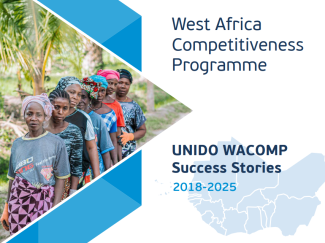Transforming West Africa: UNIDO’s Lasting Impact on Trade, Growth, and Lives through the WACOMP
UNIDO is proud to celebrate the transformative impact of the West Africa Competitiveness Programme (WACOMP), a major regional initiative that has measurably strengthened trade competitiveness, empowered businesses, and improved livelihoods across the region. Through targeted support for value chains, quality infrastructure, and business environments, WACOMP has enabled thousands of producers, enterprises, and institutions to become more competitive, resilient, sustainable and integrated into regional and global markets, directly addressing challenges such as limited competitiveness and weak value chain integration.
In response to challenges such as limited competitiveness and weak value chain integration, UNIDO—entrusted by the European Union (EU) — implemented eight project components from 2018 to 2025, including the regional West Africa Competitiveness and Quality Infrastructure Project (WACQIP) and seven national projects in Ghana, Guinea, Guinea Bissau, Sierra Leone, The Gambia, Cabo Verde, and Senegal. With a €29 million portfolio, UNIDO supported West African economies in becoming more dynamic, inclusive, and resilient to global challenges like climate change and epidemics.
Funded under the 11th European Development Fund, WACOMP was a €116 million programme implemented in partnership with the EU, ECOWAS, and UEMOA, spanning one regional and sixteen national components. It focused on improving priority value chains and enhancing the business climate, while supporting regional integration—particularly into the African Continental Free Trade Area (AfCFTA).
In Guinea-Bissau for example, UNIDO empowered women entrepreneurs to scale their agro-processing businesses and created over 240 jobs for women, in The Gambia, five onion curing and storage facilities have been constructed to reduce post-harvest losses and increase production capacities, in Ghana, over 500 market linkages have been established resulting in SME expansion to 13 new markets, in Guinea, the project supported creating the National Observatory for Competitiveness (ONCP) and helped to develop the first-ever National Industrial Development Policy (PNDIG), in Sierra Leone, the project supported the establishment of the country’s first internationally accredited certification body, in Senegal, around 100 companies have been capacitated in their digital marketing to reach broader markets and online sales, and on the regional level, 89 regional standards across key sectors such as cassava, mango and textile have been developed and adopted through the Programme support, allowing businesses to trade more freely within the region and leading to better consumer protection and environmental sustainability.
As WACOMP concludes, UNIDO — alongside the International Trade Centre (ITC) — remains committed to building on its legacy through the Africa Trade Competitiveness and Market Access (ATCMA) – ECOWAS Programme in the tune of 50 mio EUR.
UNIDO thanks all partners for their invaluable contributions and invite you to explore the final newsletter to learn more about the stories of the many WACOMP beneficiaries and how the Programme has supported them throughout the years in becoming more competitive within national, regional, continental and international trading systems.
The Success Stories can be viewed and downloaded here.
For more information please contact Mr. Bernard Bau (b.bau [at] unido.org)

